You walk by the room where your mama cat has been growling and hissing her litter of kittens. She growls and hisses. “What just happened?” you wonder to your mama cat.
Is she unwell? Is she turning into a poor mother?” She didn’t do so.
Maternal behavior disorders in cats can be caused by a variety of factors.
If a mother cat is threatened by other animals, humans, loud noises, or other stressful circumstances, she can abandon her kittens or become violent against them and hissing/growling/attacking at her kittens.
In addition, first-time moms could be more vulnerable to behavioral issues.
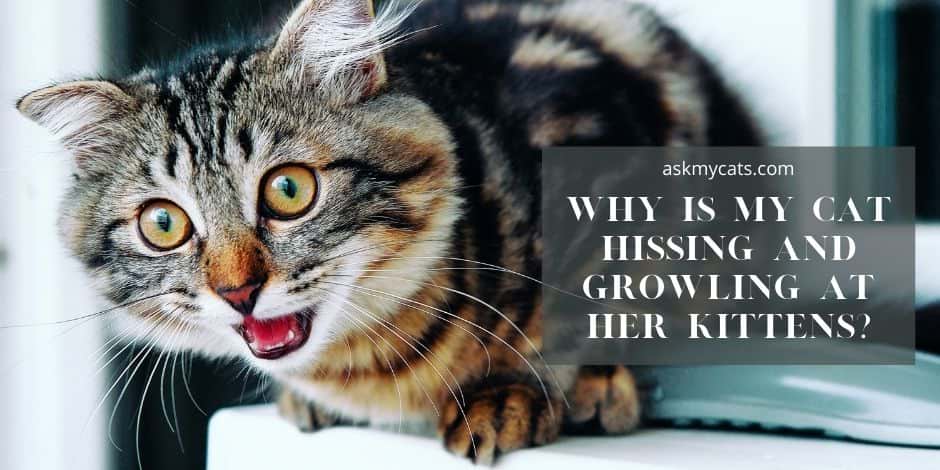

Give Your Cat the Perfect Day
Get the Free Ebook!
Why Is My Cat Hissing/Growling At Her Kittens?
1. Tired Mother
Your mommy cat has been caring for all of her kittens around the clock, feeding them, forcing them to go potty, washing them, and showing them how to use the litter box. What a relief! She’s been beaten!
She’s asking her young ones, “Hey, I need a few moments of me-time,” at that stunning moment when she opens her mouth and lets out that distinctive hiss.
Take a break or go outside to enjoy. “Right now!” It’s natural behavior, and there’s no need to take the babies away from her. If you try, you’ll be rewarded with some uncomfortable bruises.
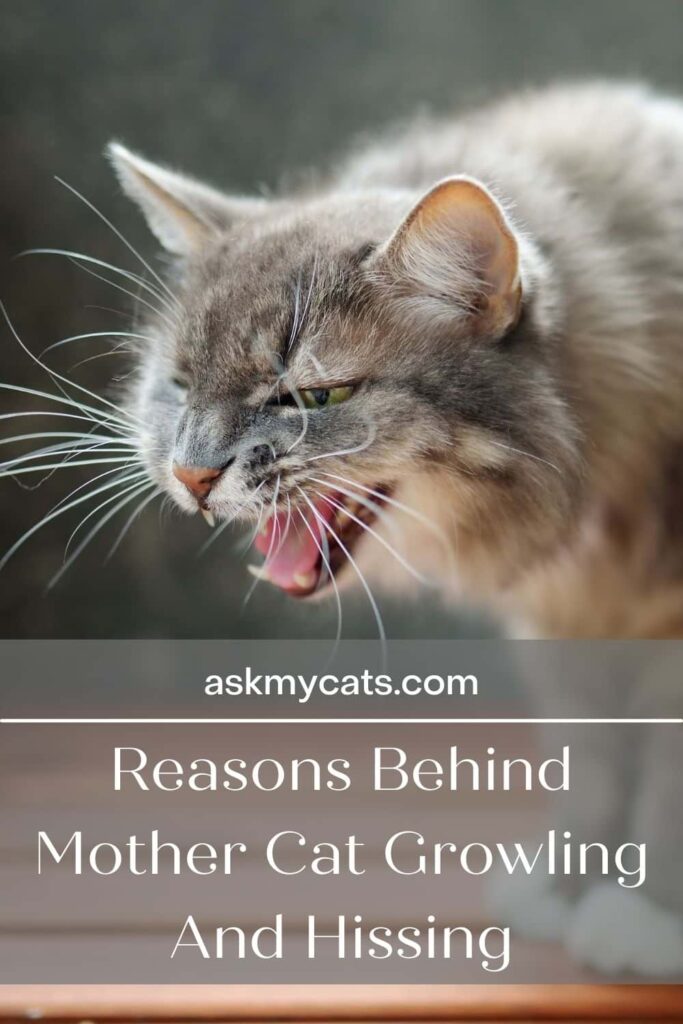
2. Weaning Period
Both kittens grow up to be tall, adult kittens. They occasionally ignore the signal that it’s time to pack up and leave Mama.
She’s fed up with feeding them all the time.
She needs to broaden her horizons and devote more of her time to herself, snoozing away her days in her beloved armchair.
She’ll hiss and growl at them to get some peace and quiet. She’ll let them know when it’s time to wean, which is generally about six weeks.
Mama is concerned that there will be a scarcity of food. When she’s weaned her boys, she decides it’s not in anyone’s best interests for them to stay, so she’ll growl and say, “Chop, chop!” “Get out of here!”
3. Quest For Food
Mama will decide she wants to go find food for herself and probably her children if she and her babies spend any of their days outside.
Without the distractions, misbehavior, and noise the kittens produce, it’s much easier for her to “store.” Mama is certain that if her babies don’t scare the prey away, she’ll be able to get something in.
If some kittens want to pursue her, she’ll turn around and hiss at them. They do not expect it, so they’ll stumble back to their original location and wait for her to return.
4. Goodbye To Kitties
Mama notices her kittens are nearly adults and thinks it’s time for them to wean themselves from her, so she lets out a mama-hiss and a growl that means, “OK, kiddos!” It’s time to get out and get your own place!” She can see when they’re about to be more self-sufficient.
When it comes to kicking their babies out of the house, mama cats are ruthless. When the time comes, the time comes.
Mama isn’t neglecting them by throwing them out before their first birthdays because kittens grow easily. Really, she’s doing the best she can for them.
5. Hormonal Hazards
Maternal behavior disorders in cats can be caused by a variety of factors. Researchers recently discovered that certain genes regulate certain forms of mothering behavior in cats.
Mother cats may lack the normal ability to mother their litter if they are missing or have a deficient mothering-related gene.
Hormonal variations are also to blame for issues with maternal activity. A hormonal anomaly may cause a cat to have a false pregnancy, in which she shows signs of having kittens, including labor symptoms including contractions, but she is not pregnant.
Stress may also contribute to problems. If a mother cat is threatened by other animals, humans, loud noises, or other stressful circumstances, she can abandon her kittens or become violent against them. In addition, first-time moms could be more vulnerable to behavioral issues.
6. Routine Disrupted
Cats can be a little bossy! They dislike change and might be worried or perplexed by some new family members.
Make an effort to divide your time between your cats; you will need to give more reassurance to your resident cat than normal.
When your pets are unsettled, they can hiss and show other aggressive behaviors.
Keep their timetable as similar to their normal as possible, because the new kitten is the only thing that has changed. Your cats will be a lot happier if they have control of their surroundings.
7. No Space To Be Shared
Remember that your resident cat has been the owner of the house for quite some time; they are used to getting their way, and they may be hesitant to share their room with a new kitten.
Make sure your cats have enough food and water; set up one litter box per cat, plus one spare, in different places. Make sure your resident cat isn’t showing dissatisfaction by eliminating outside the cage.
Each kitty needs regular and convenient access to its own food, water, scratching post, and litter box, as well as their favorite toys and sleeping or hiding spots.
Often make sure that an exit is open to prevent the kitties from being stressed; understanding that they will walk away will help prevent kitty tensions from emerging.
Your cats would appreciate having the option of getting some alone time when they need it, so stop confining them to the same room with no exits.
Allow your cats to separate themselves if they aren’t getting along, or safely diffuse the situation by talking loudly or clapping loudly.
Allow them to meet on their own terms; never push them to be together; instead, keep doors open and watch them.
You might like to read about will a mother cat kill her kittens if you touch them
How To Check On Mother Cat’s Material Behavior Issues
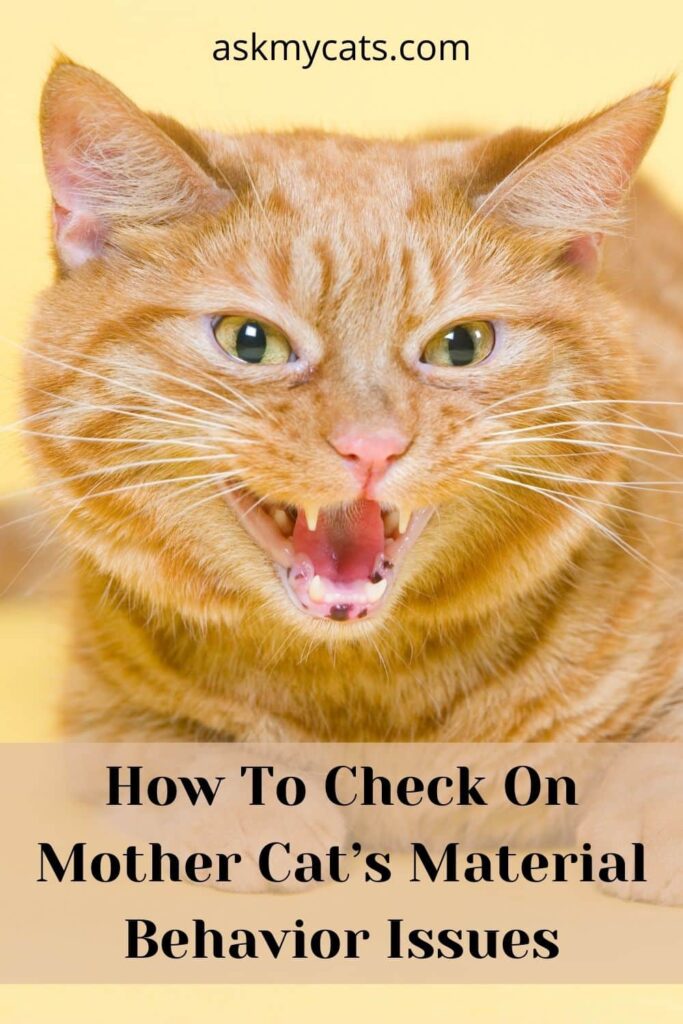
It would be a simple analytical job to detect the existence of material behavior issues in your animal.
The veterinarian’s primary priority when it comes to diagnosis will be on identifying the root cause of the abnormal behavior.
A proper medical evaluation at the veterinarian’s office would be the first step in diagnosing this disorder, as it is for most others.
For this tour, you can bring the mother cat and any kittens she might have.
It’ll be crucial to provide a detailed account of your cat’s actions, with any escalation or adjustments.
You should also provide as much information as possible on any outside stressors or other pertinent details about your cat’s living conditions.
Your veterinarian will check your cat for any apparent medical problems. Your veterinarian would then prescribe a full blood panel to null out bacteria or hormone conditions as the source of the problems.
A urinalysis may be ordered by your veterinarian to screen for hormones that are normally released during birth.
Also, check out Cat Growling After Giving Birth: Is It Normal?
How Can You Treat Your Growling Mother Cat?
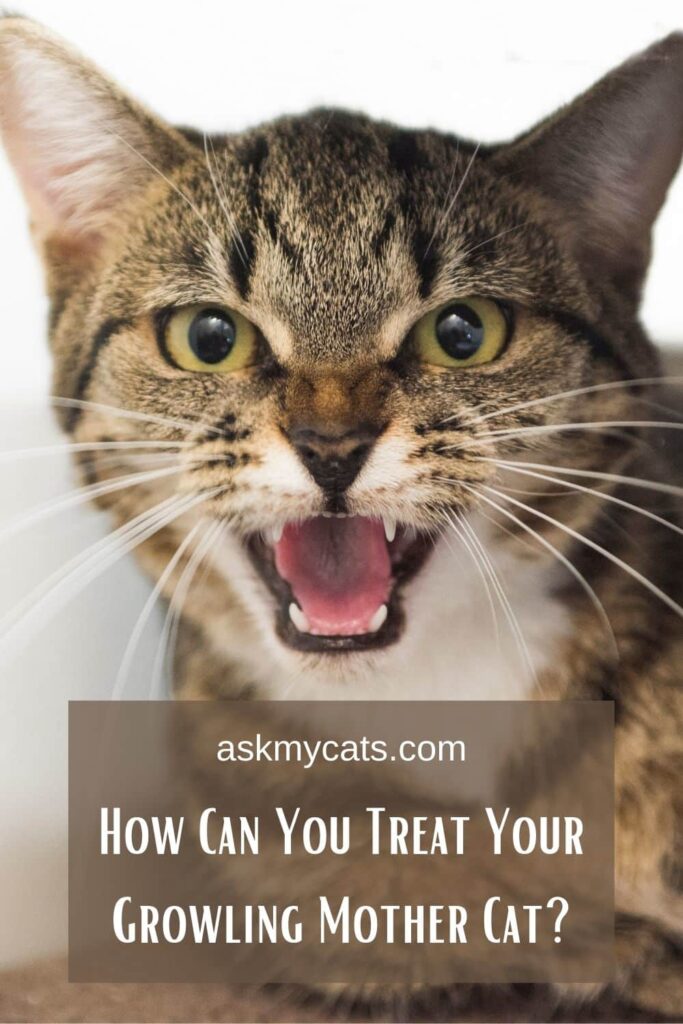
Treatment for maternal behavior disorders in cats can vary from management to medication, depending on the nature of the cat’s behavior and the existence of underlying conditions.
The most popular type of therapy is management. Separating mother cats with anger disorders from their kittens and hand-nursing them or having a foster mother for the kittens are examples of this.
The signs of repetitive maternal behavior would usually go away on their own within a few days.
In the most serious cases, your veterinarian can recommend hormone therapies to reduce or remove symptoms like nursing or uterine contractions.
Cats that exhibit repetitive maternal behavior can benefit from spaying.
The destruction of the genital organs has been shown to cure most species of this disease.
Also, check out the reasons behind kittens attacking older cat
How Can The Mother Cat Be Recovered From Maternal Behavior Issues?
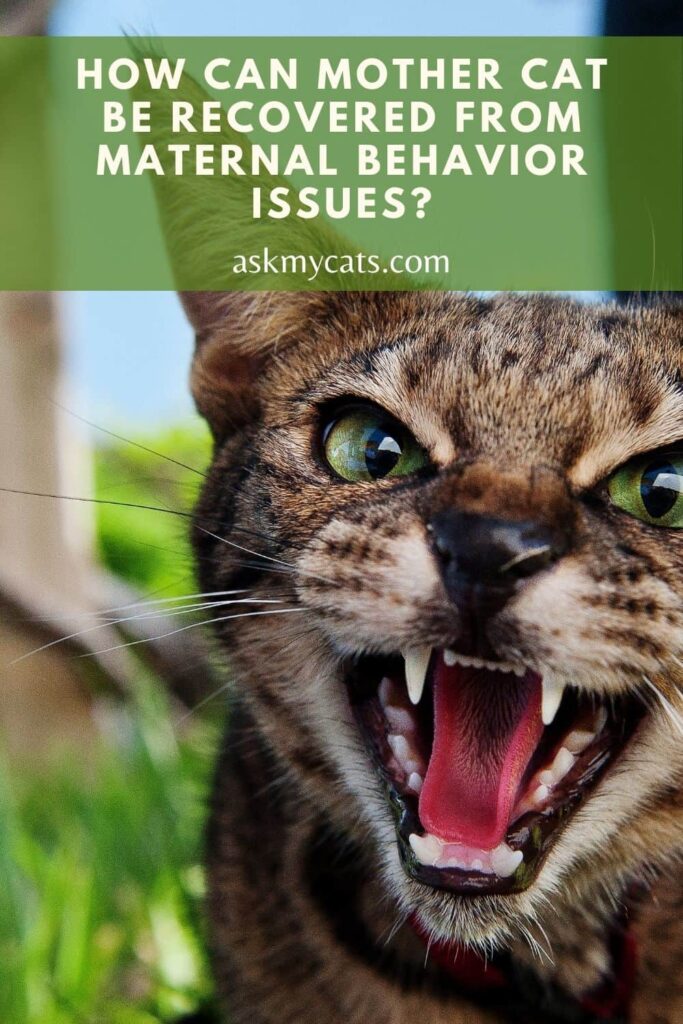
Effective treatment of your cat’s maternal behavior issues is critical to your cat’s complete recovery and the stable growth of any kittens.
Owner monitoring can help manage hostility or inattentiveness problems with your cat against her kittens.
To encourage the kittens to feed, you may need to muzzle or otherwise restrain your cat until they are old enough to be transferred to other sources of nutrition.
It might be enough for you to observe and be present with the mother cat and her kittens in order to encourage feedings and cleanings in the case of inattentive mothers that are not aggressive.
A calm, quiet space for your mother cat’s nest should also be given.
This may help the mother recover and can decrease or remove nervous behaviors such as abandonment or repetitive movement of the kittens.
Separating the mother cat from other cats or species is also a good idea.
Cats with maternal behavior issues should heal well with careful care. After the kittens have matured, the signs will usually go away on their own.
Spaying cats with maternal behavior disorders is a good idea since the symptoms are likely to recur during future pregnancies.
Must Read: Why Is My Pregnant Cat So Mean And Aggressive?
Frequently Asked Questions
How do I stop my cat from hissing at my kitten?
Some cats may instinctively hiss or act assertively when you introduce a new kitten, so you’ll need to offer lots of reassurance and extra attention. If your cat is frequently hissing at your kitten, keep meetings short and brief, using a FELIWAY Diffuser to help them remain comfortable and calm.
How long will it take for my cat to stop hissing at my new kitten?
If it takes more than seven days for the hissing to stop, things need to go more gradually. Allow the cats to see each other while maintaining a physical barrier, such as stacking baby gates in the doorway, opening the door an inch or two and using a door stop to keep the door open, or putting in a screen door.
Why is my cat suddenly hissing and growling at my other cat?
Cats aren’t afraid to use aggression to protect their territory. Looking out the window and seeing another cat walking around outside could trigger aggression. Sometimes a cat becomes territorial when you give attention to another household pet, and will suddenly attack you or the other pet.
Will my cat hurt a new kitten?
A kitten under 16 weeks old is a baby, physically weak, and can easily be hurt by an older cat. Your goal is to try to not have negative things happen between the new kitten and the older cat (except for a bit of hissing). There are some adult cats who take to little kittens right away, happily filling in as “mom”.
Final Words
Are you too scared about your mother cat being ferocious against her kittens?
Do let us know in the comments section below!

That’s all fine… But what about a stray that trusts you but then becomes aggressive to everyone including her kittens when she and her kittens are brought inside so they don’t freeze in the snow? They have everything they need even though she is pregnant again. I didn’t see anything about this in this article.
It is not uncommon for cats who have been living on their own to be unsure or even scared when they are first brought into a new environment. This fear can sometimes manifest as aggression, particularly if the cat feels threatened or uncomfortable. In these situations, it is important to give the cat plenty of space and time to adjust to their new surroundings.
One way to help a scared or aggressive cat to adjust to a new environment is to create a safe space for them where they can retreat if they feel overwhelmed or threatened. This might be a separate room or a large crate or kennel that is equipped with all of the things they need, such as a bed, litter box, food and water dishes, and toys. You can also help the cat to feel more comfortable by providing them with a variety of hiding places, such as cardboard boxes or pet tents, where they can go if they feel scared or anxious.
It is also important to be patient and understanding with a scared or aggressive cat. Avoid making any sudden movements or loud noises that might startle them, and avoid staring directly at them or trying to touch them without giving them time to adjust to your presence. Instead, try to establish a routine that includes regular feeding and watering times, as well as regular litter box cleaning and other daily tasks. This can help the cat to feel more comfortable and secure in their new environment.
Finally, consider seeking the advice of a veterinarian or a professional animal behaviorist if the cat’s aggression persists or becomes worse. They will be able to provide you with specific advice and guidance on how to help the cat to adjust to their new surroundings and how to address any underlying issues that may be contributing to their aggression.
I got my cat’s kittens groomed and when they were back ,my pet cat(mother) is growling and hissing and even trying to hurt them.how long will
This continue?
It’s really common for a mother cat to react this way after her kittens have been groomed. The grooming process can change their scent, making the mother cat feel like they’re strangers.
This behavior usually doesn’t last too long, but it can be unsettling. Here are a few things you can do to help:
1. **Reintroduce the Scent**: Try rubbing a soft cloth on the mother cat and then gently rub the same cloth on the kittens. This can help transfer her scent back to them and make them smell more familiar.
2. **Supervised Interaction**: Keep an eye on them when they’re together to make sure no one gets hurt. If she’s being really aggressive, you might need to separate them for short periods and gradually reintroduce them.
3. **Time and Patience**: Give it a little time. Usually, within a few days, the mother cat should start to recognize her kittens again and calm down.
If the behavior continues for more than a few days or seems to get worse, it might be worth consulting with a vet or a behaviorist to make sure there’s nothing else going on. Hopefully, things will settle down soon!